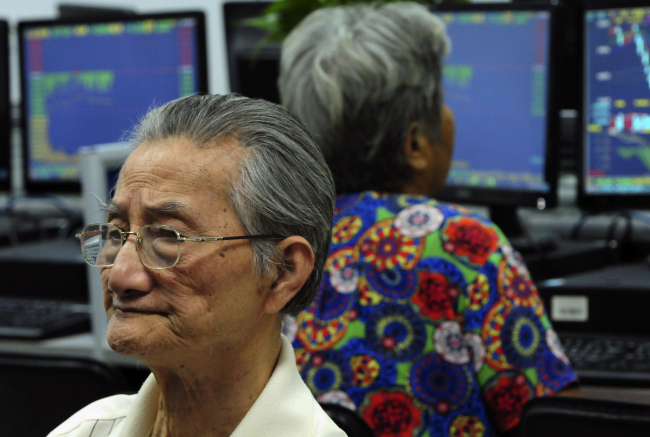Korean researchers open ways for early Alzheimer’s diagnosis
By 이다영Published : Sept. 3, 2015 - 18:23
South Korean researchers’ latest findings on Alzheimer’s disease patients may provide a new, efficient method for early diagnosis of the mental illness, the nation’s Health Ministry announced Thursday.
The research, organized by the Korea National Institute of Health, discovered that elderly Alzheimer’s disease patients had larger amount of a specific family of small proteins, named SUMO1, in their blood, compared to healthy elderly Koreans. It researched a total of 80 elderly Alzheimer’s disease patients with mild symptoms as well as 133 healthy Koreans aged 65 or older.
It is the first time in the world that the association between the particular proteins and the patients’ blood plasma has been proven. The scholarly paper, coauthored by a number of researchers including Koh Young-ho, was published in the Journal of Alzheimer’s Disease, a peer-reviewed international medical journal, earlier this month.
The research, organized by the Korea National Institute of Health, discovered that elderly Alzheimer’s disease patients had larger amount of a specific family of small proteins, named SUMO1, in their blood, compared to healthy elderly Koreans. It researched a total of 80 elderly Alzheimer’s disease patients with mild symptoms as well as 133 healthy Koreans aged 65 or older.
It is the first time in the world that the association between the particular proteins and the patients’ blood plasma has been proven. The scholarly paper, coauthored by a number of researchers including Koh Young-ho, was published in the Journal of Alzheimer’s Disease, a peer-reviewed international medical journal, earlier this month.

“We hope the findings will help medical experts to come up with a more efficient and simple method of early diagnosis of the disease. We hope more patients can get diagnosed with the disease with a simple blood test,” said Song Ji-hyun from the Korea Centers for Disease Control and Prevention.
Song, however, said a blood test that relies on SUMO1 levels in patients’ blood plasma is not effective on individuals suffering from mild cognitive impairment. “While many patients who have mild cognitive impairment later develop dementia, the latest findings can be only applied to those who have already developed Alzheimer’s disease, however serious their symptoms are,” she said.
“The findings are still meaningful because early diagnosis is crucial in treating Alzheimer’s, so those who have very mild symptoms can benefit from the new diagnosis method once it becomes available.”
Currently, a FDG-PET scan, a medical imaging technique that produces a 3-D image of a functional process in the body, is commonly used in Korea to make a prognosis for dementia management or early diagnosis.
The test uses a small dose of a radioactive drug to show differences between healthy and diseased tissue. It has a 79 percent chance of correctly identifying those with dementia, according to the National Evidence-based Healthcare Collaborating Agency. The test, however, is expensive and currently not covered by the national health insurance program. The cost of a single scan ranges from 600,000 won ($504) to 1.2 million won.
With the elderly population rapidly increasing, dementia is considered one of the most serious threats to Korea’s future economy. Health authorities predict the number of people with the disease will exceed the number of those who are aged 65 or older by 2024, and that it will cost some 43.5 trillion won to treat by 2030.
As of 2012, 71.3 percent of all Korean dementia patients have Alzheimer’s disease. The government predicts that at least 15.06 percent of the entire Korean population will have dementia by the year 2050.
The government has been making a number of efforts to prevent the brain disease, including banning on-campus drinking and encouraging the elderly to exercise regularly. While physical inactivity and heavy drinking are considered as major risk factors for dementia, more than 80 percent of the Korean elderly are known to spend their leisure time solely by watching TV, while 11.9 percent of all Koreans are known to be heavy drinkers.
By Claire Lee (dyc@heraldcorp.com)


![[Exclusive] Korean military set to ban iPhones over 'security' concerns](http://res.heraldm.com/phpwas/restmb_idxmake.php?idx=644&simg=/content/image/2024/04/23/20240423050599_0.jpg&u=20240423183955)




![[Pressure points] Leggings in public: Fashion statement or social faux pas?](http://res.heraldm.com/phpwas/restmb_idxmake.php?idx=644&simg=/content/image/2024/04/23/20240423050669_0.jpg&u=)



![[Herald Interview] 'Amid aging population, Korea to invite more young professionals from overseas'](http://res.heraldm.com/phpwas/restmb_idxmake.php?idx=644&simg=/content/image/2024/04/24/20240424050844_0.jpg&u=20240424200058)






